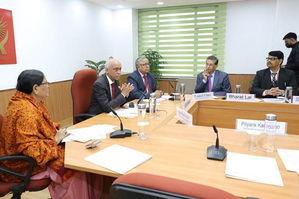New Delhi, Jan 6 (IANS) Running a pilot project using robots for cleaning sewer lines and septic tanks was among the suggestions made by experts at a discussion on the rights of manual scavengers and ensuring their dignity organised by the National Human Rights Commission (NHRC), said an official on Monday.
Addressing the discussion on ‘Dignity and Liberty of the Individuals — Rights of Manual Scavengers’, NHRC Chairperson, Justice V. Ramasubramanian said that it is necessary to study and understand the causes to suggest remedial measures.
He stressed the need for running a pilot project using technology/robots for cleaning sewer lines and septic tanks to begin with one state to see its outcome and further replication in other parts of the country, a statement said.
NHRC Secretary General, Bharat Lal said that the Commission has taken up the issue of the implementation of mechanized cleaning processes by various states and the steps taken by them in this regard.
It has emerged that various states have prepared a three-year programme for all Urban Local Bodies in accordance with the guidelines issued by the Supreme Court in Dr Balram Singh v/s Union of India case.
He also highlighted how certain castes and communities are disproportionately affected by this practice of manual scavenging.
The discussion was attended by NHRC Members Vijaya Bharathi Sayani, and Justice (Dr) Bidyut Ranjan Sarangi, and other senior officers.
Attendees included representatives from various ministries and state governments, NGOs, human rights defenders, UN agencies, private organizations, and research scholars, contributing to discussions on pertinent issues regarding the rights of manual scavengers and ensuring dignity.
NHRC Joint Secretary, Devendra Kumar Nim, gave an overview of the three technical sessions- ‘Addressing the issue of deaths in septic and were tanks in India,’ ‘The need for a complete ban on manual scavenging,’ and ‘Rehabilitation measures for manual scavengers: A path towards dignity and empowerment and the way forward.’
He said that manual scavenging is one of the biggest challenges society is facing today, which needs to be addressed with concerted collective efforts.
Some of the suggestions which emanated from the discussions included the need for better representation and ground-level monitoring to ensure effective welfare implementation and surveys for effective implementation of rehabilitation programmes and minimum wages.
Experts also batted for making a distinction between sanitation workers and manual scavengers in the 2013 Act.
They also called for offering incentives for mechanization of cleaning and imparting training for it to women-led SHGs for sustainable livelihoods.
Transparency was also needed in manual scavenging data and sewer death reporting, budget analysis, and awareness campaigns under SBM and NAMASTE schemes, said experts
–IANS
rch/skp






























